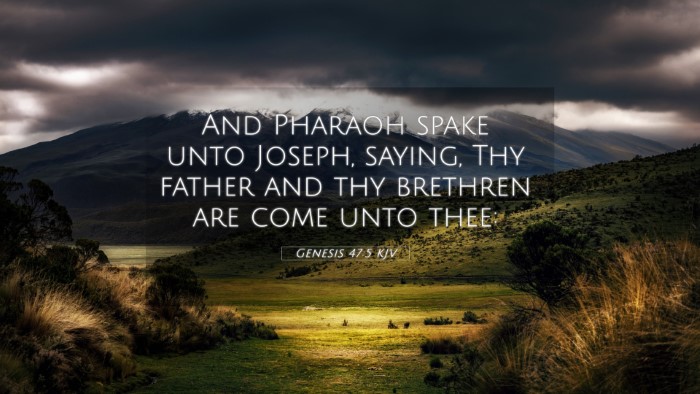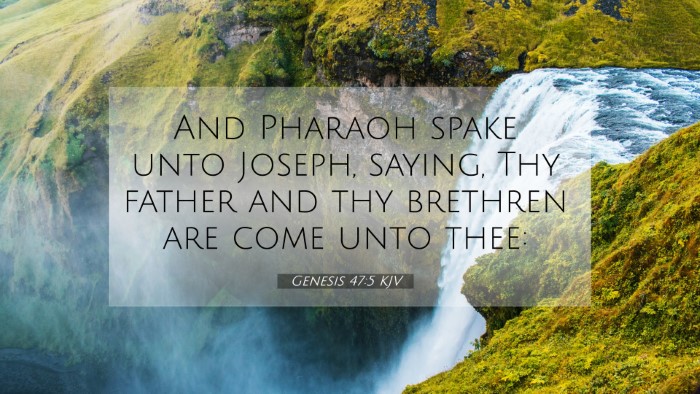Understanding Genesis 47:5
Verse Reference: Genesis 47:5
In this verse, we see a pivotal moment as Joseph, having brought his family to Egypt, introduces his father, Jacob, to Pharaoh. This highlights the intersection of divine providence and human relationships, showcasing how God orchestrates events to fulfill His promises.
Summary of Insights
Historical Context: This passage occurs during a time of famine, demonstrating not only Joseph's foresight in gathering grain but also his role as a savior, both to his family and to Egypt. Jacob’s humble approach before Pharaoh symbolizes the respect due to royal authority, intertwined with the recognition of God's provision.
Commentary Insights
- Matthew Henry: Henry emphasizes the importance of humility. Jacob, despite being the patriarch, approaches Pharaoh with reverence, illustrating a lesson in submission to authority.
- Albert Barnes: Barnes reflects on the political implications of Joseph's actions, noting the significance of Jacob's presence in Egypt and the strategic importance of aligning with Pharaoh during the famine crisis.
- Adam Clarke: Clarke draws attention to Jacob's character and his understanding of God's providence. His meeting with Pharaoh is not just about survival; it signifies a theological acknowledgment of God's control over all situations.
Cross-Referenced Verses
This verse can be compared and analyzed alongside several other passages in the Bible:
- Genesis 41:46: Joseph's rise to power in Egypt.
- Genesis 47:11: Joseph provides for his family and establishes them in the land of Goshen.
- Romans 13:1: Acknowledgment of the governing authorities as instituted by God.
- Psalm 105:17-21: God’s plan through Joseph that led to the preservation of His people.
- Matthew 2:13-15: The parallel of divine guidance in times of danger and the protection of God's chosen.
- Acts 7:14: Stephen recounts the journey of Joseph and the relocation of Jacob’s family to Egypt.
- Hebrews 11:21: A note on Jacob's faith and his blessings for his children.
- Exodus 1:7: The growth of the Israelites in Egypt, contrasting initial favor and subsequent oppression.
- James 4:10: A reminder of humility before God and men, reflective of Jacob’s demeanor before Pharaoh.
- Philippians 3:20: The concept of citizenship in a higher kingdom, paralleling the Israelites in a foreign land.
Thematic Connections
This exploration brings forth important themes and applications:
- Divine Providence: Understanding God's hand in the trajectory of history.
- Humility before Authority: The importance of respecting those in power while maintaining one's identity in Christ.
- God’s Faithfulness: The continuity of God's promise to Abraham, Isaac, and Jacob through the preservation of their lineage.
- Family and Community: The significance of familial bonds and collective identity in the face of challenges.
Tools for Cross-Referencing
For readers interested in deeper study, consider utilizing the following:
- Bible Concordance: A tool to locate scripture references related to specific topics.
- Bible Cross-Reference Guide: Useful for finding thematic connections and parallels.
- Cross-reference Bible Study Methods: Strategies for engaging with related scriptures.
- Comprehensive Bible Cross-Reference Materials: Resources that align similar verses for theological insight.
Inter-Biblical Dialogue
The connections between Genesis 47:5 and various New Testament teachings provide an excellent opportunity for comparative analysis:
- Identifying Inter-Testamental Connections: Explore how Joseph's leadership and Jacob's faith are echoed in the leadership of Christ and the New Covenant themes.
- Links between the Prophets and Apostolic Teachings: Consider how the stories of redemption weave through both Testaments.
- Cross-Referencing Psalms with New Testament Teachings: Examine prayers and songs as reflections of trust in God's provision akin to Jacob's journey.
- Bible Cross References for Sermon Preparation: Valuable for teaching moments that address faith in challenging circumstances.
Conclusion
Genesis 47:5 stands as a testimony of God’s providence and the human experiences surrounding it. Through its historical, theological, and practical applications, the verse invites readers into a deeper reflection on faith, humility, and the interconnectedness of Scripture.


